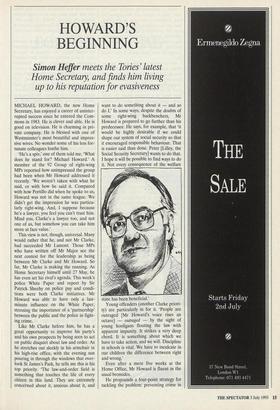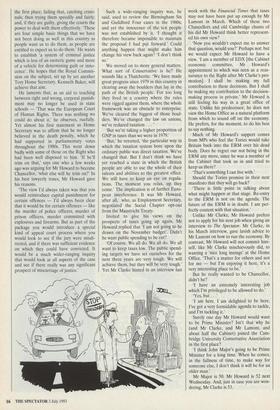HOWARD'S BEGINNING
Simon Heifer meets the Tories' latest
Home Secretary, and finds him living up to his reputation for evasiveness
MICHAEL HOWARD, the new Home Secretary, has enjoyed a career of uninter- rupted success since he entered the Com- mons in 1983. He is clever and able. He is good on television. He is charming in pri- vate company. He is blessed with one of Westminster's most beautiful and impres- sive wives. No wonder some of his less for- tunate colleagues loathe him.
'He's a spiv,' one of them told me. 'What does he stand for? Michael Howard.' A member of the 92 Group of right-wing MPs reported how unimpressed the group had been when Mr Howard addressed it recently. 'We weren't taken with what he said, or with how he said it. Compared with how Portillo did when he spoke to us, Howard was not in the same league. We didn't get the impression he was particu- larly right-wing. And, I suppose because he's a lawyer, you feel you can't trust him. Mind you, Clarke's a lawyer too, and not one of us, but somehow you can take him more at face value.'
This view is not, though, universal. Many would rather that he, and not Mr Clarke, had succeeded Mr Lamont. Those MPs who have written off Mr Major see the next contest for the leadership as being between Mr Clarke and Mr Howard. So far, Mr Clarke is making the running. As Home Secretary himself until 27 May, he has even set his rival's agenda. This week's police White Paper and report by Sir Patrick Sheehy on police pay and condi- tions were both Clarke initiatives. Mr Howard was able to have only a last- minute influence on the White Paper, stressing the importance of a 'partnership' between the public and the police in fight- ing crime.
Like Mr Clarke before him, he has a great opportunity to improve his party's and his own prospects by being seen to act on public disquiet about law and order. As he stretches out sleekly in his armchair in his high-rise office, with the evening sun pouring in through the windows that over- look St James's Park, he tells me this is his top priority. 'The law-and-order field is something that touches the life of every citizen in this land. They are extremely concerned about it, anxious about it, and
want to do something about it — and so do I.' In some ways, despite the doubts of some right-wing backbenchers, Mr Howard is prepared to go further than his predecessor. He says, for example, that 'it would be highly desirable if we could shape our system of social security so that it encouraged responsible behaviour. That is easier said than done. Peter [Lilley, the Social Security Secretary] wants to do that. I hope it will be possible to find ways to do it. Not every consequence of the welfare
state has been beneficial.'
Young offenders (another Clarke priori- ty) are particularly in for it. 'People are outraged [Mr Howard's voice rises an octave] — outraged — by the sight of young hooligans flouting the law with apparent impunity. It strikes a very deep chord. It is something about which we have to take action, and we will. Discipline in schools is vital. We have to inculcate in our children the difference between right and wrong.'
Even after a mere five weeks at the Home Office, Mr Howard is fluent in the usual bromides.
He propounds a four-point strategy for tackling the problem: preventing crime in the first place; failing that, catching crimi- nals; then trying them speedily and fairly; and, if they are guilty, giving the courts the power to deal with them effectively. 'These are four simple basic things that we have not been doing as well in this country as people want us to do them, as people are entitled to expect us to do them.' He wants to establish 'a system of criminal justice which is less of an esoteric game and more of a vehicle for determining guilt or inno- cence'. He hopes that the Royal Commis- sion on the subject, set up by yet another Tory Home Secretary, Kenneth Baker, will achieve that aim.
He laments that, as an aid to teaching between right and wrong, corporal punish- ment may no longer be used in state schools — 'That was the European Court of Human Rights. There was nothing we could do about it,' he observes, ruefully. Yet almost his first statement as Home Secretary was to affirm that he no longer believed in the death penalty, which he had supported in parliamentary votes throughout the 1980s. This went down badly with some of those on the Right who had been well disposed to him. 'If he'll trim on that,' says one who a few weeks ago was arguing for Mr Howard to become Chancellor, 'what else will he trim on?' In his best lawyerly tones, Mr Howard gave his reasons.
'The view I'd always taken was that you would reintroduce capital punishment for certain offences — I'd always been clear that it would be for certain offences — like the murder of police officers, murder of prison officers, murder committed with explosives and firearms. But as part of the package you would introduce a special kind of appeal court process where you would look to see if the jury were misdi- rected, and if there was sufficient evidence on which they could have convicted. It would be a much wider-ranging inquiry that would look at all aspects of the case and see if there really was any significant prospect of miscarriage of justice.' Such a wide-ranging inquiry was, he said, used to review the Birmingham Six and Guildford Four cases in the 1980s; and yet the innocence of the ten people was not established by it. 'I thought it therefore became impossible to maintain the proposal I had put forward.' Could anything happen that might make him change his view back again? 'I don't think so.'
We moved on to more general matters. What sort of Conservative is he? He sounds like a Thatcherite. 'We have made great progress since 1979 in this country in clearing away the boulders that lay in the path of the British people. For too long they lived in a country where the rules were rigged against them, where the whole framework was an obstacle to enterprise. We've cleared the biggest of those boul- ders. We've changed the law on unions, we've reduced taxation .
'But we're taking a higher proportion of GNP in taxes than we were in 1979.'
'But,' he retorted, 'the particular way in which the taxation system bore upon the ordinary public was direct taxation. We've changed that. But I don't think we have yet reached a state in which the British people are able to use the whole of their talents and abilities to the greatest effect. We still have to keep an eye on regula- tions. The moment you relax, up they come.' The implication is of further Euro- pean interference. It was Mr Howard, after all, who, as Employment Secretary, negotiated the Social Chapter opt-out from the Maastricht Treaty.
Invited to give his views on the prospects of taxes going up again, Mr Howard replied that 'I am not going to be drawn on the November budget'. Didn't he want public spending to be cut?
'Of course. We all do. We all do. We all want to keep taxes low. The public spend- ing targets we have set ourselves for the next three years are very tough. We will achieve them, but they will be very tough.' Yet Mr Clarke hinted in an interview last
week with the Financial Times that taxes may not have been put up enough by Mr Lamont in March. Which of these two Chancellors and old Cambridge chums of his did Mr Howard think better represent- ed his own view?
'Now you wouldn't expect me to answer that question, would you?' Perhaps not: but we would expect Mr Howard to have a view. 'I am a member of EDX [the Cabinet economic committee, Mr Howard's appointment to which was seen as a reas- surance to the Right after Mr Clarke's pro- motion]. I shall be making my full contribution to these decisions. But I shall be making my contribution to the decision- making process in private.' Mr Howard is still feeling his way in a great office of state. Unlike his predecessor, he does not view the Home Office as a natural platform from which to sound off on the economy. He prefers, for the moment, to do his best to say nothing.
Much of Mr Howard's support comes from MPs who feel the Tories would take Britain back into the ERM over his dead body. Does he regret our not being in the ERM any more, since he was a member of the Cabinet that took us in and tried to keep us there?
'That's something I can live with.'
Should the Tories promise in their next manifesto that they will go back?
'There is little point in talking about what might happen at that stage. Re-entry to the ERM is not on the agenda. The future of the ERM is in doubt. I am per- fectly content with that situation.'
Unlike Mr Clarke, Mr Howard prefers not to apply for his next job when giving an interview to The Spectator. Mr Clarke, in his March interview, gave lavish advice to Mr Lamont on how to run the economy. By contrast, Mr Howard will not commit him- self, like Mr Clarke mischievously did, to wanting a 'nice long innings' at the Home Office. 'That's a matter for others and not for me — but I'm enjoying it here, it's a very interesting place to be.'
But he really wanted to be Chancellor, didn't he?
'I have an extremely interesting job which I'm privileged to be allowed to do.' 'Yes, but. .
'I am here. I am delighted to be here. I've got a very formidable agenda to tackle, and I'm tackling it.'
Surely one day Mr Howard would want to be Prime Minister? Isn't that why he (and Mr Clarke, and Mr Lamont, and about half the Cabinet) joined the Cam- bridge University Conservative Association in the first place?
'I think John Major's going to be Prime Minister for a long time. When he comes, in the fullness of time, to make way for someone else, I don't think it will be for an older man.'
Mr Major is 50. Mr Howard is 52 next Wednesday. And, just in case you are won- dering, Mr Clarke is 53.



















































 Previous page
Previous page